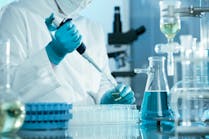Microbiology and molecular testing can complement one another in the clinical lab
Microbiology testing is important in diagnosing and treating diseases in patients based upon the presence of one or more microorganisms. Molecular testing is important in predicting, diagnosing, and treating diseases or disabilities related to changes in cells at the molecular level. What happens when the two cross? How can laboratorians manage testing and diagnosis when they overlap? These are becoming important questions for labs that seek to provide the best care for patients while managing resources efficiently.
Focus on microbiology testing
Microbiology testing is centered on the identification of microorganisms such as pathogens, molds, bacteria, and yeast. Each of these can cause serious health issues in humans. Some are allergens; others cause severe infection or failure of major organs, and can lead to serious illness or death.
Microscopic organisms can be single-cell, a cell colony, or acellular. Microbiology testing can include virology, mycology, parasitology, and bacteriology. Pathogens can be from external sources such as the environment, other people, or animals, or they can be from internal sources (host-based).
The diagnosis of most types of illnesses caused by microorganisms requires testing. Clinical symptoms are rarely sufficient for diagnosis, because a variety of infections present in similar ways. Clinical information about the patient, however, is needed to determine which types of diagnostic studies should be performed. Such information includes demographic data about the patient and information about symptoms, onset of symptoms, progression of symptoms, treatments already tried, and suspected exposures. Different types of specimens also have requirements for collection, storage, and transportation; the lab will inform the physician of these requirements at the time of order.
In short, the Microbiology lab performs tests on specimens that include microorganisms to diagnose the type of illness and to provide an interpretation of the results.
Focus on molecular testing
Molecular diagnostics (MDx) are used to diagnose, monitor, and treat an existing disease; detect risk; and determine specific treatments for individual patients based on their unique biological markers for developing disease and for passing on abnormalities to children. Molecular testing is relevant to any diseases or malformations that relate to cells.
There are several sub-focuses of MDx:
Genetic testing identifies changes in genes, chromosomes, and/or proteins. It is done to either confirm or rule out a condition, whether that condition is currently present, is one that the patient might develop (to include the related risk percentage), or is one that could be passed on to a child.
Infectious disease testing. Many types of infectious disease are diagnosed using molecular diagnostic assays. Examples include sexually transmitted diseases, healthcare-associated diseases, hepatitis, and diseases of the respiratory and central nervous system. Benefits of utilizing molecular testing methodologies for infectious disease diagnosis include rapid detection, identification of new strains, and sensitivity. Molecular techniques can also have applications in population health management (regarding potential outbreaks).
Oncology testing for gene alterations can aid in the diagnosis of cancer. Gene alterations can include single nucleotide variants, small duplications of nucleotides (whether consecutive, single or multiple, or complex mutations), structural variants, or exon copy number changes. Tumor or cell testing is critical because each type of tumor responds differently to treatment and chemotherapies. It is thus important to identify the specific genetic makeup of the tumor in each individual patient.
Hematology testing is performed on whole blood, bone marrow, and flow separated cells. Testing will provide diagnosis, monitor efficacy of treatment and disease progression, and offer prognoses for diseases such as hemophilia, leukemia, von Willebrand disease, and thrombosis. It can also aid in monitoring of graft, bone marrow, and stem cell transplantation.
Pharmacology. Molecular testing as it relates to pharmacology helps to determine and support specific treatment plans for disease and individuals. Just as individuals will respond differently to treatment and different drugs, so will tumors. Molecular testing of how genes express proteins, as well as mutations and specific tumors and malignant cells, can aid in determining treatment efficacy and drug resistance.
Working together
Overlapping areas of testing revolve mainly around infectious diseases. The microbiology lab should be performing molecular testing on infectious diseases.
Many infectious diseases are best diagnosed using molecular testing methodologies to determine the stage and progression of the disease and to plan the best management of the disease. The best patient care and outcomes, at the most reasonable cost, may be achieved by following that model. Many assays used in microbiology testing for infectious disease are highly complex in both their development and their application. This is amplified when there is an unusual pathogen, a new pathogen, or a mixed infection present. In such cases, adding molecular to traditional methods may be indicated.
With the emergence and growth of molecular testing, labs that are expanding and incorporating this type of testing into traditional clinical practice have resource-related issues to address. Most facilities have to entertain the question of centralization or decentralization of the multidisciplinary test menus. The answer often boils down to the ability to achieve efficiencies based upon equipment, expertise, personnel, reagents, and location.
Lisa-Jean Clifford, CEO, Psyche Systems Corporation





